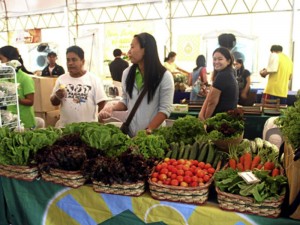DTI: Prices of basic goods stable amid calamity
MANILA, Philippines – Prices and supply of basic goods remained steady and stable even in the areas that did not declare to be in a state of calamity, the Department of Trade and Industry said Wednesday.
Trade Secretary Gregory L. Domingo said DTI teams had been monitoring the markets in Metro Manila and provinces in Luzon to look into the availability of basic commodities and to ensure that businesses would observe the price freeze in the areas placed under a state of calamity.
“The declarations on these areas under state of calamity hasten the rescue, relief and rehabilitation efforts of the government and the private sector, including any international humanitarian assistance, and for the department, effectively freezes the prices of basic necessities for the affected areas,” Domingo said.
As reported Tuesday, areas declared under a state of calamity were Narvacan and Sta. Maria in Ilocos Sur; Bataan; Cavite; Macabebe, San Fernando, Masantol, Guagua, Macabebe, and Minalin in Pampanga; Sta. Rosa, Cabuyao, San Pedro, Calamba, Los Baños and Biñan in Laguna; San Mateo, Rizal; Pateros; and Paranaque City.
“Our offices give special attention to areas under state of calamity to implement the price freeze on basic necessities and to closely watch the market for any abuse on price and supply of said goods,” added Trade Assistant Secretary Blesila A. Lantayona.
“We saw that the supply of basic goods is abundant, and are ready for picks by the consumers, yet, there were only few who were buying. In addition, we requested the operators of the market to regularly update the DTI-Department of Agriculture Price Billboards where the suggested retail prices (SRPs) of basic goods were indicated so the consumers can easily refer to it,” Lantayona further said.
Those who will violate the price freeze will be slapped with up to P1 million in administrative fine and/or a maximum of 10-year imprisonment, as provided under Republic Act 7581 or The Price Act.
Under Section 6 of The Price Act, prices of basic necessities in an area shall automatically be frozen at their prevailing prices or placed under automatic price control whenever that area is proclaimed or declared a disaster area or under a state of calamity; declared under an emergency; placed under martial law; or declared to be in a state of rebellion, among others.
Commodities covered by the price freeze included canned sardines, processed milk, coffee, detergent soap, bread, candles, salt, rice, corn, cooking oil, fresh pork/beef/poultry meat, fresh/dried fish/marine products, fresh egg, fresh milk, fresh vegetables, rootcrops and sugar.
RELATED STORIES:
Rains, floods affect over 1 million people

